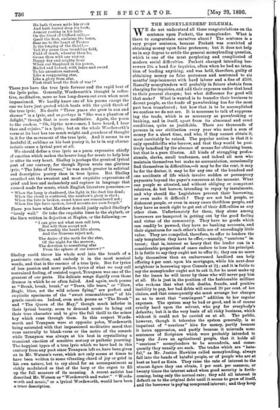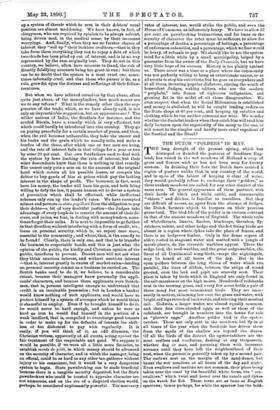THE MONEYLENDERS' DILEMMA.
WE do not understand all these congratulations on the sentence upon Pockett, the moneylender. What is there to congratulate ourselves about ? The sentence is a very proper sentence, because Pockett was convicted of obtaining money upon false pretences; but it does not help us in any degree to settle the general moneylending question, which is one of the most perplexing and complicated of modern social difficulties. Pockett charged intending bor- rowers 10s. a head for inquiries, often when be had no inten- tion of lending anything, and was held, therefore, guilty of obtaining money on false pretences and sentenced to six months' imprisonment with hard labour and a fine of 2500. Rascally moneylenders will probably in future abstain from charging for inquiries, and add their expenses under that head to their general charges ; but what difference for good will that make ? What is wanted is to transfer their business to decent people, as the trade of pawnbroking has for the most part been transferred ; bat how that is to be accomplished we confess we do not see. It is nonsense to talk of suppress- ing the trade, which is as necessary as pawnbroking or banking, and in itself, apart from its abnormal and cruel conditions, quite as justifiable. There are thousands of persons in our civilisation every year who need a sum of money for a short time, and who, if they cannot obtain it, must inevitably be ruined. The popular notion is that it is only spendthrifts who borrow, and that they would be posi- tively benefited by the absence of means for obtaining loans, but that is a pure illusion. All kinds of struggling profes- sionals, clerks, small tradesmen, and indeed all men who maintain themselves but make no accumulation, occasionally find themselves in difficulties,—it may be for the rent, it may be for the doctor, it may be for any one of the hundred and one accidents of life which involve sudden or peremptory payments beyond the payer's resources at the moment. What can people so situated, and without obliging or competent relatives, do but borrow, intending to repay by instalments, and why should the Legislature prevent their borrowing, or even make it difficult ? They are not bad people, or dishonest people, or even in many cases thriftless people, and they have as much right to get out of their difficulties as any other class. Unfortunately for them, they alone among borrowers are hampered in getting out by the good feeling and virtue of the community. They have no goods which can readily be pawned, they have no banking accounts, and their signatures for each other's bills are of exceedingly little value. They are compelled, therefore, to offer to lenders the only temptation they have to offer,—namely, "usurious" in- terest; that is, interest so heavy that the lender can in a considerable proportion of cases endure to lose his principal. It is futile to say they ought not to offer it; they can no more help themselves than an embarrassed landlord can help offering 4 per cent. upon his mortgages, while his next-door neighbour is borrowing upon Consols at 2i ; and it is futile to say the moneylender ought not to ask it, for be must make up for the losses he will incur by those who will never pay him at all. He is just in the position of the fashionable milliner who reckons that what with deaths, frauds, and positive inability to pay, her bad debts will exceed 20 per cent, of her claims, and that consequently she must arrange her charges so as to meet that "contingent" addition to her regular expenses. The system may be bad or good, and is of course cruelly hard upon the solvent, who pay for everybody's defaults; but it is the very basis of all risky business, which without it could not be carried on at all. The public, however, though it tolerates the system generally, is so impatient of "usurious" hire for money, partly because it hates oppression, and partly because it misreads SOME sentences of Scripture which were probably intended tc keep the Jews an agricultural people, that it holds all "usurious" moneylenders to be scoundrels, and conse- quently they usually are such. The trades which are " hate- ful," as Mr. Justice Hawkins called moneylending, always fall into the hands of hateful people, or of people who are at best as hard as flints. They raise the rate of interest to the utmost figure they can obtain, 5 per cent. per mensem, or twenty times the interest asked when good security is forth- coming, being only the normal rate; they add all interest in default on to the original debt until it seems to grow of itself, and the borrower is paying compound interest; and they keep
up a system of threat, which to men in their debtors' usual position are almost maddening. We have known, in fact, of clergymen, who are required by opinion to be always solvent, being driven mad, in the medical sense, by their incessant worryings. And, finally, when they see no further chance of interest they "sell up" their luckless creditors,—that is, they take from them everything they can to repay a debt of which two-thirds has been piled up out of interest, and is in no way represented by the sum originally lent. They do not in this country, we believe, often have recourse to fraud, the risk of directly falsifying accounts being too great to run ; but there can be no doubt that the system is a most cruel one, some- times infernally cruel, and that those who pursue it do, as a rule, grow fat upon the distress and sufferings of their fellow- creatures.
But when we have relieved ourselves by that abuse, often quite just abuse, of the moneylenders, how much nearer are we to any reform? What is the remedy other than the sup- pression of the trade, which, as we have already said, is not only an impracticable suggestion, but an oppressive one ? The wilder natives of India, the Sonthals for instance, and the settled Bheels, have a remedy which is very effectual, but which could hardly be introduced into this country. They go on paying peacefully for a certain number of years, and then, when the evil becomes unbearable, they take the usurer and his books and the grain which he usually sells, and make a bonfire of the three, after which one or two men are hung, and the rate of interest falls in that village for a year or two by some 20 per cent. Our own forefathers used to deal with the system by laws limiting the rate of interest, but their wiser descendants know that there is nothing in that remedy. The usurer only puts a sum on to the amount of the original bond which covers all his possible losses, or compels the debtor to buy goods of him at prices which pay the lacking interest in the shape of profit. The borrower, in fact, must have his money, the lender will have his gain, and both being willing to defy the law, it passes human wit to devise a system of prevention which shall be effectual, while ineffectual schemes only run up the lender's rates. We have exempted minors and persons in statit papillari from the obligation to pay their debts—a bit of very doubtful justice—the Judges take advantage of every loophole to restrict the amount of their de- crees, and juries, we fear, in dealing with moneylenders, some- times forget their oaths. It is next to impossible to go farther in that direction without interfering with a form of credit, viz., loans on personal security, which is, we repeat once more, essential to the community ; and where, then, is the remedy to be found ? Clearly, there is only one, and that is to transfer the business to respectable hands, and this is just what the opinion of the public, the kindly and Christian opinion of the public, interferes to prevent. Decent men will not ask what they think usurious interest, and without usurious interest —that is, interest greatly in excess of market-rates—lending on personal security cannot as a business be carried on. The Scotch banks used to do it, we believe, to a considerable extent, because their managers knew personally the appli- cants' characters, and because those applicants were Scotch- men, that is, persons intelligent enough to understand that credit is an invaluable possession ; but in London a banker would know nothing of such applicants, and would have to protect himself by a system of averages which he would think it shameful to employ. Even if he brought himself to do it, he would never be hard enough, and unless he were as hard as iron he would find himself in the position of a weak landlord, that is, compelled to overcharge good tenants in order to make up for the defaults of tenants too shift- less or too dishonest to pay with regularity. It is really, if you will think of it, an odd dilemma, the Christian virtues, apparently at all events, acting against the fair treatment of the respectable and good. We suppose it would be possible, if we were all a little more Socialist, to establish moats de piitg, in which money should be advanced on the security of character, and in which the manager, being an official, could be as hard as any other tax-gatherer without injury to his conscience, but it would be a very dangerous system to begin. State pawnbroking can be made beneficial because there is a tangible security deposited, but the State pawnbrokers who could be trusted to appraise character are not numerous, and on the eve of a disputed election would, perhaps, be considered unpleasantly powerful. The necessary rates of interests too, would strike the public, and even the House of Commons, as infamously heavy. We have to allow 12 per cent, on pawnbroking transactions, and for loans on the security of character the rates must be sufficient to allow for a percentage of deaths, a percentage of boltings, a percentage of unforeseen calamities, and a percentage, which we fear would be heavy, of refusals to pay. We should like to see the system tried for a little while by a small municipality, helped by a guarantee from the owner of the Daily Chronicle, but we have very little hope of its success. History is too plainly against us. There never was a time or a place where the community was not perfectly willing to hang an extortionate usurer, or at all events to stop his extortions, but he goes on everywhere and at all times, incurring popular disfavour, stirring the wrath of benevolent Judges, waking editors, who are the modern "prophets," into flames of righteous indignation, and growing fat in the midst of all those disagreeables. We even suspect that when the Social Millennium is established and money is abolished, he will be caught lending orders on the State shops at GO per cent, and heaping up eatables and clothing which he can neither consume nor wear. We wonder whether the Socialist leaders when they catch him will read him daily lectures upon the superiority of the many to the one, or will resort to the simpler and hardly more cruel expedient of the Southal and the Bheel



































 Previous page
Previous page